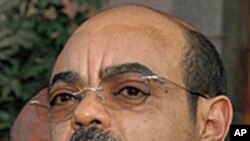Ethiopia's Prime Minister Meles Zenawi over the weekend rejected U.S. criticism of several of his government's policies and laws, but described the country's relationship with Washington as "solid." Mr. Meles took particular exception to a U.S. diplomat's comments about Ethiopia's ethnic policies.
The Ethiopian leader reacted sharply to comments made by U.S. Ambassador to the U.N. Human Rights Council in Geneva Douglas Griffiths.
Speaking at a council meeting last week, Ambassador Griffiths questioned Ethiopia's contention that there is a fair representation of nationalities in government institutions. He said independent observers note that most senior government positions are represented by one ethnicity.
The dominant role of ethnic Tigrayans in the government, especially in the military, has often been a contentious political issue in Ethiopia. Tigrayans make up about six percent of the population.
But Prime Minister Meles flatly rejected Ambassador Griffiths' assertions. "I have not heard of such idiocy. But if it has occurred, it proves the idiocy of the person in Geneva," he said.
Speaking to reporters before traveling to the climate conference in Copenhagen, Mr. Meles also dismissed a U.S. critique of Ethiopia's restrictions on human rights and press freedom.
The U.S. embassy in Addis Ababa last week took the unusual step of urging Ethiopia to review a recently passed law restricting the activities of non-governmental organizations receiving foreign funding. The law goes into effect next month.
The Center for International Human Rights at Chicago's Northwestern University issued a report last month saying the measure effectively silences human rights defenders and advocates of democratic governance. The center described the Charities and Societies Proclamation, or CSO, as "the most restrictive of its kind in sub-Saharan Africa" and compared it to similarly repressive laws in Zimbabwe and Russia.
But Prime Minister Meles defended the measure, saying it is in line with democratic norms. "There is no possibility of us changing the CSO law because we believe it is a perfectly legitimate law and consistent, if not with the theory, consistent with the practice in the advanced democracies," he said.
The Ethiopian leader also rejected U.S. concerns about the closure of a newspaper that had criticized government policies. The U.S. embassy said the closure of the Addis Neger newspaper and charges against other private journalists and publishers might contribute to a perception that space for independent media in Ethiopia is constrained.
The media rights group Reporters Without Borders said the decision of Addis Neger's editors to close the paper and flee the country was evidence of a climate of fear.
Mr. Meles said such criticisms are not based on facts. "We don't take this institution seriously. Because they have proven to us over again, they take any allegation against the government as the last word in the Bible and they do not try to verify the facts," he said.
At the same time, Prime Minister Meles scoffed at reports that suggest Ethiopia's relationship with the United States is strained. He called bilateral ties "mature." "It was never off track. People assumed it was off track because of some idiot comment made by this or that particular person in this or that particular place. But the relationship is quite solid, has always been based on things other than passing emotions," he said.
Mr. Meles said he had not seen the U.S. embassy statement or the comments by the U.S. representative at the U.N. Human Rights Council. But he said, "I respect the rights of the United States to express its opinion on any matter under the sun, or if they want to, even on any matter over the sun."
News
Ethiopia PM Rejects US Criticism, Calls Ties with Washington 'Solid'

Meles takes particular exception to a U.S. diplomat's comments about Ethiopia's ethnic policies



